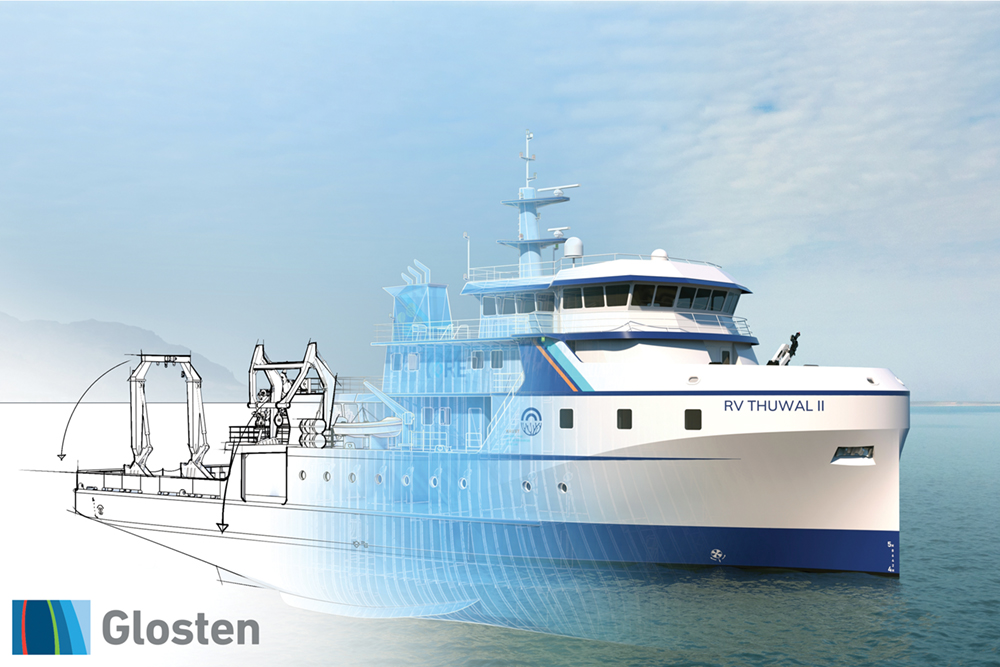
Seattle-based naval architecture firm Glosten revealed June 8 that it has been selected to design a new marine research vessel for King Abdullah University of Science and Technology (KAUST).
The vessel would be in keeping with KAUST’s mission to provide world-class marine research and support Saudi Arabia’s goals to study and protect marine environments. The state-of-the-art oceanographic research vessel would replace KAUST’s existing vessel, Thuwal.
The new research vessel, according to KAUST, would bring advanced research capabilities for work in both shallow reef and deepwater environments, a reconfigurable deck for multipurpose jobs and equipment, and weather hardy traits for managing the unique conditions of the Red Sea.
The nearly 22-year-old Thuwal, which was originally designed as a fishing vessel for navigating the coastal waters of Australia, has served KAUST scientists for as many as 220 days at sea per year since 2013. However, the retrofitted 34.7-meter long (113.85-foot) vessel is limited in the tasks and sea conditions it can manage, according to the university.
“As KAUST expands its research ambitions for studying the Red Sea, a robust vessel with optimal functionality is required,” the university said in a statement.
The Glosten-designed ship is expected to bring increased stability and reliability for operating year-round in the Red Sea, Gulf of Aqaba and areas with similar tropical waters and climatic conditions.
Custom designed features, according to KAUST, are expected to meet a broad range of oceanographic missions, including seawater, sediment, and biological sampling to the full depth of the Red Sea, about 3,000 meters.
At 50 meters long (49.2 feet), the new research vessel would be significantly larger and offer a greater range of operational capabilities. The deck would be designed to deploy heavy equipment and sophisticated instrumentation for multiple disciplines, including geoscience, bioscience, marine science, and oceanographic research interests.
It would also be equipped with an advanced positioning system to enable deployment of long-duration remote and autonomous vehicles as well as geoscience sampling systems.
“The combined features will position KAUST to make new discoveries that will enhance investigations and collaborations, and evolve knowledge about this young ocean that will, in turn, better support the Kingdom (of Saudi Arabia) and its environmental and economic initiatives,” the university said in a statement.
The ship would be the only advanced marine vessel of its kind uniquely built for and dedicated to conducting research in the Red Sea and run by scientists and crew with expertise specific to this body of water, according to the university.
“KAUST is a major hub for marine research in the Red Sea, and we are expanding our activities to better integrate with the Kingdom’s growing interests,” KAUST Vice President for Research and Distinguished Professor Dr. Donal Bradley said. “Our investment in a world-class research vessel underscores a commitment to fully support our partners here in Saudi Arabia and around the world, and give KAUST faculty, researchers, and students unrivaled infrastructure to pursue their exciting research plans.”
Glosten has provided design and engineering support to the oceanographic research community for more than 60 years, working with scientists and operators to provide economical designs that are optimized for marine science, operational areas, and low emissions. The firm has been contracted to provide the design, shipyard tendering support, and construction oversight through delivery to KAUST, with the project slated to complete in 2026.
“Our team is excited to bring this new level of research vessel capability to the Red Sea region. Optimizing a vessel for KAUST for the specific conditions of the operating area and science research needs requires a high level of engagement between our engineers and the KAUST team,” Glosten Principal Ken FitzGerald said. “This is when we are at our best.”
